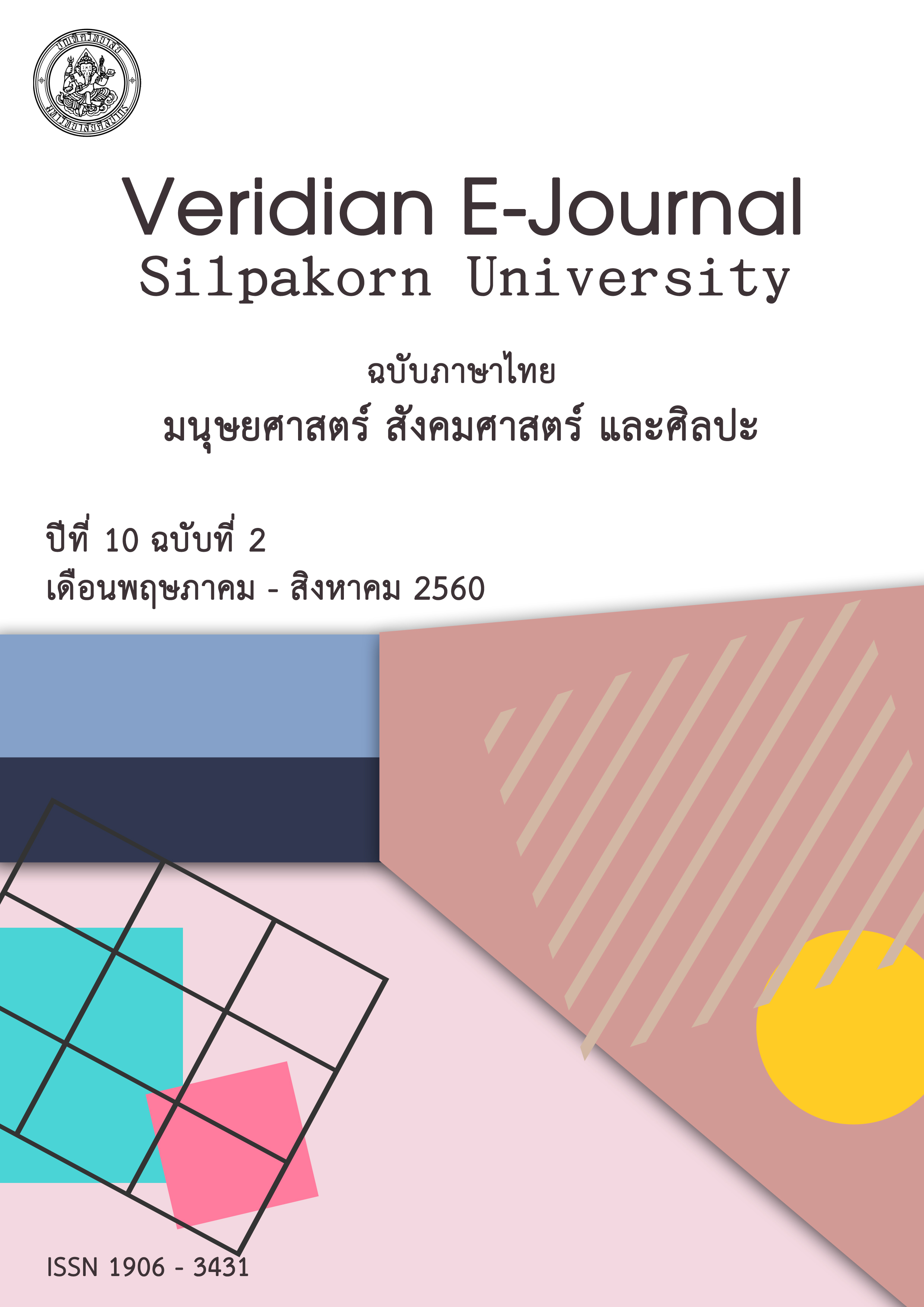การพัฒนาผลการเรียนรู้และทักษะการแสวงหาความรู้ เรื่อง ภูมิปัญญาไทยของนักเรียนชั้นมัธยมศึกษา ปีที่ 2 ด้วยการจัดการเรียนรู้แบบสืบเสาะหาความรู้
Main Article Content
Abstract
การวิจัยครั้งนี้มีวัตถุประสงค์เพื่อ 1) เปรียบเทียบผลการเรียนรู้เรื่องภูมิปัญญาไทยของนักเรียนชั้นมัธยมศึกษาปีที่ 2 ก่อนและหลังการจัดการเรียนรู้แบบสืบเสาะหาความรู้ 2) ศึกษาพัฒนาการทักษะการแสวงหาความรู้ของนักเรียนชั้นมัธยมศึกษาปีที่ 2 ด้วยการจัดการเรียนรู้แบบสืบเสาะหาความรู้ 3) เปรียบเทียบทักษะการแสวงหาความรู้ ของนักเรียนชั้นมัธยมศึกษาปีที่ 2 ก่อนและหลังการจัดการเรียนรู้แบบสืบเสาะหาความรู้และ 4) ศึกษาความคิดเห็นของนักเรียนชั้นมัธยมศึกษาปีที่ 2 ที่มีต่อการจัดการเรียนรู้แบบสืบเสาะหาความรู้ กลุ่มตัวอย่างที่ใช้ในการวิจัยคือ นักเรียนชั้นมัธยมศึกษาปีที่ 2/2 ภาคเรียนที่ 2 ปีการศึกษา 2559 โรงเรียนบ้านแหลมวิทยา อำเภอบ้านแหลม จังหวัดเพชรบุรี สำนักงานเขตพื้นที่การศึกษามัธยมศึกษาเขต 10 จำนวน 38 คน
เครื่องมือที่ใช้ในการวิจัยประกอบด้วย 1) แผนการจัดการเรียนรู้แบบสืบเสาะหาความรู้เรื่องภูมิปัญญาไทย 2) แบบทดสอบวัดผลการเรียนรู้เรื่องภูมิปัญญาไทย3) แบบประเมินทักษะการแสวงหาความรู้และ4) แบบสอบถามความคิดเห็นของนักเรียนที่มีต่อการจัดการเรียนรู้แบบสืบเสาะหาความรู้ สถิติที่ใช้ในการวิเคราะห์ข้อมูล ได้แก่ ค่าเฉลี่ย () ส่วนเบี่ยงเบนมาตรฐาน (S.D.) และสถิติทดสอบค่าทีแบบไม่เป็นอิสระต่อกัน (t-test for dependent)
ผลการวิจัยพบว่า
1. ผลการเรียนรู้เรื่อง ภูมิปัญญาไทย ของนักเรียนชั้นมัธยมศึกษาปีที่ 2 ด้วยการจัดการเรียนรู้แบบสืบเสาะหาความรู้หลังเรียนสูงกว่าก่อนเรียนอย่างมีนัยสำคัญทางสถิติที่ระดับ .05
2. ทักษะการแสวงหาความรู้ เรื่อง ภูมิปัญญาไทยของนักเรียนชั้นมัธยมศึกษาปีที่ 2 ด้วยการจัดการเรียนรู้แบบสืบเสาะหาความรู้ มีพัฒนาการสูงขึ้น
3. ทักษะการแสวงหาความรู้ของนักเรียนชั้นมัธยมศึกษาปีที่ 2 หลังการจัดการเรียนรู้แบบสืบเสาะหาความรู้สูงกว่าก่อนเรียนอย่างมีนัยสำคัญทางสถิติที่ระดับ .05
4. ความคิดเห็นของนักเรียนชั้นมัธยมศึกษาปีที่ 2 ที่มีต่อการจัดการเรียนรู้แบบสืบเสาะหาความรู้อยู่ในระดับมากที่สุด
The purposes of this research were to: 1) compare thelearning outcomeson Thai wisdom of the Mathayomsuksa 2 students before and after participation in the learning management using inquiry based learning 2) study the development of knowledge seeking skills of the Mathayomsuksa 2 students participation in the learning management using inquiry based learning 3) compare the knowledge seeking skills of the Mathayomsuksa 2 students before and after participation in the learning management using inquiry based learning and 4) study the opinion of Mathayomsuksa 2 students participation in the learning management using inquiry based learning. The sample of this research consisted of 38 Mathayomsuksa 2/2 students studying in the second semester during the academic year 2016 in Banlaem Witthaya school, Banlaem District, PhetchaburiProvince of the Office of Secondary School District 10. The instruments employed to collect data were: 1) lesson plans 2) a learning achievement test 3) a knowledge Seeking Skills test and 4) a questionaire on the opinion of Mathayomsuksa 2 students participation in the learning management using inquiry based learning. The collect data was analyzed by mean () standard deviation (S.D.), t-test for dependent.
The finding were as follows:
1. The learning outcomes on Thaiwisdom of the Mathayomsuksa 2 students participation in the learning management using inquiry based learning s after using was higher than before at the level of .05 significance.
2. The knowledge seeking skills on Thai wisdom of the Mathayomsuksa 2 students participation in the learning management using inquiry based learning was developed to higher level.
3. The knowledge seeking skillsof the Mathayomsuksa 2 students participation in the learning management using inquiry based learning s after using was higher than before at the level of .05 significance.
4. The opinion of Mathayomsuksa 2 students using inquiry based learning was at the highest level of agreement.

